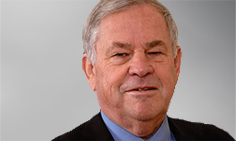GABRIEL García Márquez’s Love in the time of cholera ends relatively happily when Fermina, Florentino, the captain and his lover raise the ship’s yellow cholera flag and are thus free to cruise the river idyllically forever.
By contrast, cancer — the cholera of our day — often ends in painful reality, loss, death and grief.
“We may say we are fighting cancer”, writes Julian Barnes in his new book, Levels of life, “but cancer is merely fighting us; we may think we have beaten it, when it has only gone away to regroup. It is all just the universe doing its stuff, and we are the stuff it is being done to”.
True, care is forever progressing and cure occurs, but cancer remains a huge existential challenge of our age, eating into love and vitality, killing mothers and fathers, children and grandparents, friends and lovers. There is a desperate human side to it, as well as a technical element for which medicine is held most firmly to account.
In the latest MJA, John Best, a staunch advocate of rural medicine and a regular MJA columnist from several decades ago, returns with the first of his monthly “Best of Best” series, challenging us to consider what we mean by a good death — a question closely related to the care of people with cancer.
Cancer comes in diverse, surprising and changing forms. In an editorial, Bruce Armstrong, Australia’s foremost cancer epidemiologist, reviews recent trends in cancer incidence and mortality in Australia. He discusses the drivers of change, including screening, advances in treatment and changes in prevalence of risk factors.
Professor Ian Olver and Jutta Von Dincklage, from the Cancer Council Australia, describe an innovative approach, using a wiki-based platform, to developing guidelines for managing cancer, which allows the guidelines to be updated as soon as evidence becomes available.
Screening for cancer receives mixed press. It plays to a seductive intuition that, if only we recognised cancer early, we might do better. This intuition has rarely served us well, with cervical and colorectal cancer being notable exceptions. Even breast cancer screening, stripped to the basic statistics and freed of prevailing orthodoxy, offers less than we hoped.
Letters concerning prostate cancer screening show how far we are from a firm answer about its utility, while others debate the value of screening for lung cancer.
Given that cancer is not purely a technical problem, but also a deeply human one, what should the response of medical education be? Problem-based learning (PBL) brings students face to face with clinical realities and pursues the hypothetico-deductive model of scientific reasoning. This does not guarantee that humanistic concerns will be well covered or such skills developed.
There is a lot of PBL about these days, but is it all it is cracked up to be? A “For debate” article describes the evolution of PBL to case-based learning and then to case-supported learning, where tutors guide students’ acquisition of core biomedical knowledge and facilitate deeper learning with real patients, while a “Perspectives” article asks what the best ways are of assessing whether we and our students have reached our agreed goals.
I hope we see more about medical education in these pages in future.
Can we, and should we, see it as a task for medicine to confront the massive questions and challenges in the lives of patients with cancer — those whom we cure, those who survive many years, those requiring palliative and end-of-life support?
Cancer confronts us with our own mortality. But if we simply hoist the cancer flag and sail by, who will fulfil the duty of care? This is our condition, our time.
We should not baulk at exploring the meaning of love as a sustaining motive in our care — manifest through our professional activity — in this age.
Professor Stephen Leeder is the editor-in-chief of the MJA and professor of public health and community medicine at the University of Sydney.
This article is reproduced from the MJA

 more_vert
more_vert
Thank you for your insightful comments Professor Leeder.
Programs to facilitate skill development in effective communication can potentially be valuable for healthcare trainees and practitioners in all fields. Excellent work is being done at a variety of medical centres in various parts of the world to study empathic communication in healthcare and to develop effective and practical learning resources. For example, in the US, one of these is the I-CARE Program at the University of Texas MD Anderson Cancer Centre led by Professor Walter Baile. The I-CARE website offers a number of interesting free video learning programs. (1). Also included among the I-CARE videos are several informative talks by professors from other medical centres.
(1) http://www.mdanderson.org/education-and-research/resources-for-professionals/professional-educational-resources/i-care/index.html
I heartily commend this call to all those who deal in medical education. As an oncologist I see all too often patients who may be satisfied with our medical care but feel that we fall short on the human touch required to truly help them cope with the enormity of their problem. If only our university educators would take heed.